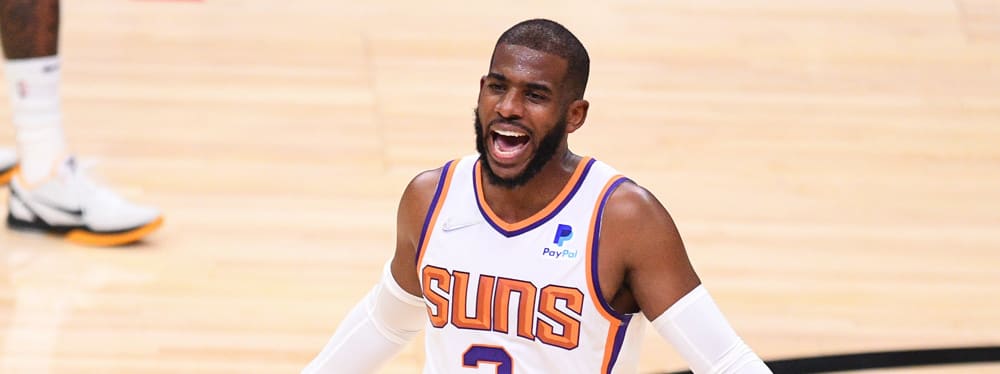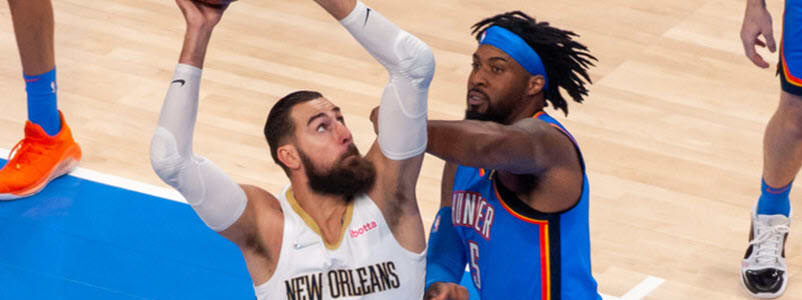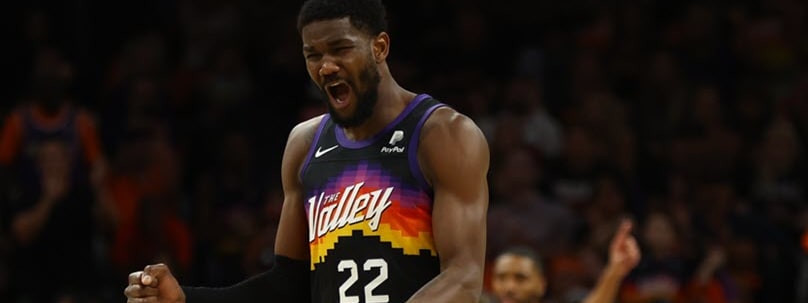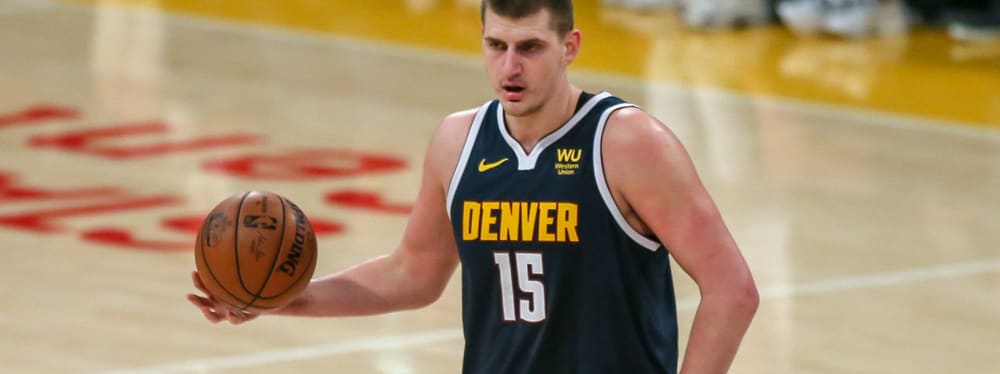Recent RotoWire Articles Featuring Jabari Parker
See More
Parker played for both the Hawks and the Kings last season, with Sacramento being his fourth team in two seasons. Parker was effective and fantasy-relevant with the Hawks while filling in for the suspended John Collins at the start of the season. From Nov. 6 to Dec. 15, Parker averaged 16.3 points on 49.1 percent shooting, 6.9 rebounds, 1.9 assists, 2.4 combined steals-plus-blocks and 1.0 threes in 28.9 minutes per game. It was downhill from there, however, as for the remainder of the campaign, the forward averaged just 9.2 points, 3.9 rebounds and 1.9 assists in 15.3 minutes per game across 11 appearances. The 25-year-old, former No. 2 pick accepted his $6.5 million player option heading into 2020 free agency, meaning he'll remain with the Kings. Given that he saw next to no time with the team last season, it seems unlikely he'll hold a fantasy-relevant role in 2020-21. Injuries remain a concern, since Parker is averaging just 47.5 games played per season in his five-year NBA career.
Parker has joined the Hawks on a one-year, $13 million deal after spending last season in Chicago and Washington. He played a key role for the Wizards, where he averaged 15.0 points and 7.2 rebounds in 25 games, and he finished the season with career highs in rebounds (6.6) and assists (2.4). The former No. 2 overall pick has failed to live up to lofty expectations, largely due to recurring knee injuries, though he could be a valuable contributor off the bench for the Hawks as a sixth man at both forward spots. There's little question regarding Parker's offensive talents (18.3 points per 36 minutes and 49.1 FG% for his career), but he has a tough time seeing heavy minutes due to defensive deficiencies. While drafting Parker in fantasy is risky, being on a one-year deal should motivate him, and the Hawks, as a rebuilding team, should be willing to give Parker plenty of opportunities.
In an act of good faith, the Bucks rescinded Parker’s qualifying offer, allowing him to sign a two-year, $40 million contract in his hometown of Chicago. While the Bucks were scared off by Parker’s two ACL tears and poor defense, the Bulls felt his upside was worth the short-term risk. Parker has played 82 games over the past two seasons, shooting 48.8 percent from the field and 37.1 percent from deep while averaging 20.6 points, 6.8 rebounds, 2.9 assists and 1.1 steals per 36 minutes. Though he’s spent just 21 percent of his career minutes at small forward, it appears that will be the position Parker is slotted into this season, as Lauri Markkanen is a lock at power forward. The move could affect his rebounding numbers, but there will be no shortage of scoring opportunities in Parker moving from Milwaukee’s 20th-paced offense to Chicago’s 10th-fastest offense. Still, the Duke product remains a risky pickup in Fantasy due to his injury history, and could see his draft position vary drastically from league to league. If he stays healthy, however, he could have a chance to be one of Fantasy’s top forwards.
Parker was in the midst of a breakout campaign before he suffered his second ACL tear in just over two years, limiting him to just 51 games. Before the injury, he was posting career highs in points (20.1), rebounds (6.2), assists (2.8) and three-point percentage (36.5). Prior to the 2016-17 campaign, Parker took just 51 total threes across 101 appearances, largely utilizing his quickness and leaping ability to attack the rack off cuts and isolation. But, he emerged as a legitimate three-point threat last year, drilling 68 of his 178 attempts from deep, boosting his overall Fantasy value and threat as a scorer. Considering his injury history, a move to a more perimeter-oriented game might be the best long-term option for Parker, though only time will tell if he adjusts his game in such a manner. The Bucks haven’t wavered from their 12-month recovery timetable for the 6-foot-8 forward at the moment, putting Parker’s return somewhere around February of 2018. As a result, his Fantasy value is somewhat up in the air. Though, assuming he can produce similar stats to last season when he returns, Parker could be worth a selection in the middle or late rounds of a Fantasy draft to bank on a big payout for the playoffs.
After a promising rookie campaign was derailed by a torn ACL, Parker was limited in training camp heading into last season. Parker’s lack of reps resulted in him missing the first four games, before he eventually took the court under a minute restriction that held through the end of November. Initially upon his return, Parker didn’t make much of a notable impact from either a fantasy or real-life perspective, playing a fairly limited role as a scorer while struggling on the defensive end. Parker’s uneven performance could be partially attributed to some rustiness in his return from a major knee operation, but once February hit, the 21-year-old took off. From the All-Star break onward, Parker averaged 18.9 points (on 49.8% shooting), 6.1 rebounds, 2.2 assists and 1.1 steals in 36.6 minutes per game, establishing himself as a worthy member of the Bucks’ stellar young nucleus that includes Giannis Antetokounmpo and Khris Middleton. Parker still has plenty of deficiencies in his game -- he’s yet to develop a reliable three-point stroke and even after the break, his defense was still problematic -- but none of those weaknesses should inhibit him from taking his fantasy stock up another notch in 2016-17. It would be nice if he could contribute more in the non-scoring categories, but for a mid-round draft pick, he’ll fill out a fantasy roster nicely.
The second overall pick in 2014 is still in the midst of rehabbing his left knee following an ACL tear in December. Regardless of when Parker is cleared to return to the court, he's expected to pick up where he left off prior to the injury. In 25 starts last season, Parker averaged 30 minutes, 12.3 points, 1.7 assists, and 5.5 rebounds per game. Prior to the injury, the imposing, 6-9 Parker was named the Eastern Conference Rookie of the Month for October/November, and he shot nearly 60 percent from the field in the month of December. Already boasting one of the stingiest defenses in the league, the Bucks view Parker as the high-volume scorer and shot creator who can push them past the first round of the playoffs. With a great deal of the club's future hinging on his progress, the Bucks are in no position to rush Parker back from injury. While hope remains that he'll be ready for Opening Night, it's possible Parker's return could be delayed several weeks. Whenever he does return, he's expected to step in as the starting power forward, but he'll also see time at small forward in what could often be a fairly positionless frontcourt rotation.
The second-overall pick in the 2014 NBA Draft, Parker shined as a freshman at Duke last season, averaging 19.1 points, 8.7 rebounds, and 1.2 assists in 35 games. While Mercer ousted Duke in the first round of the NCAA Tournament, Parker was named to the All-ACC First Team and finished second to T.J. Warren for conference player of the year honors. A potential franchise-changing type of talent, Parker immediately steps in as the face of a franchise transitioning into a new era. He figures to see big minutes from day one and is virtually guaranteed to open the season as a starter. The question, though, is: where will new coach Jason Kidd play him? At 6-8, 235, Parker has prototypical size for the small forward spot, but he's also an excellent finisher around the rim and has experience in a stretch-four role. A 36-percent three-point shooter, Parker is comfortable working on the perimeter, as well as driving to the rim. Some reports have suggested the Bucks allegedly intend to use him at power forward, but with Ersan Ilyasova already on the roster, the small forward spot appears to make more sense. Regardless, Parker should be among the NBA's most productive rookies, even if he struggles to adjust to the pace of the NBA game.












